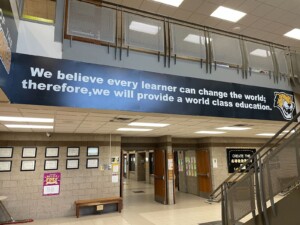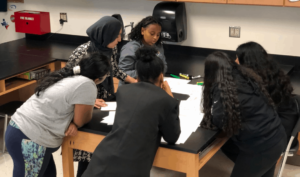Developing Character, Courage & College Readiness

Leaders often cut their own path. That is certainly the case for Dan Scoggin, perhaps the most countercultural guy in K-12. The Phoenix school network leader has an unusual “reverence for western tradition.” Back-to-basics doesn’t come close to describing Great Hearts Academies, a K-12 charter network offering “classical education, revolutionary schools.”
The elementary schools follow the Core Knowledge curriculum. There are no electives in high school (other than the latin/greek track). All the graduates go to college, most of them selective. Critics argue that’s possible only because Great Hearts targets middle income communities, although the schools in Phoenix serve the entire Metro area, including low income communities.
The high school day starts with Humane Letters, a two-hour Socratic seminar where students read great books and the founding documents. They ask, what does it mean to be human? What is justice? Students apply two rules: textual evidence and reason in the common pursuit of truth. Seniors write a thesis and defend their work in front of a panel and their peers.
There is no reference to pop culture at Great Hearts–just the study of spirit, law, and philosophy. “Character is not an outcome–it is a state of being first,” said Scoggin. “Character arises from forming habits of heart.” Elementary students at Great Hearts focus on “comportment.”
Raphael’s painting School of Athens (1510) adorns the lobby of all Great Hearts schools–placing the Aristotle-Socrates dialectic center stage. There’s no BYOD here, Scoggins thinks “Kids need a place away from technology to relax and think big thoughts.”
Scoggins uses unusual language to describe aims: the lifelong pursuit of truth, goodness, and beauty. He’s happy to list what they love: 1) moral intellectual and physical virtue, 2) western tradition, 3) human dignity and freedom, 4) philosophical realism, 5) conversation and community, and 6) humility. The school culture is “about service and love.”
Families are lining up in Phoenix and soon Great Hearts will have a Texas network. “Families want a school that stands for something,” said Scoggins, “They long for an idealistic focus.”
Kern Convening. As previewed last week, The Kern Family Foundation convened grantees focused on character development this week. David Pistrui (a Romanian rocker, Austrian economist, and super smart program evaluator) facilitated the program. DSST Public Schools and Educational Enterprises joined Great Hearts, as well as higher ed and NGO partners.
“We’re a values first organization,” said Kurtz of DSST. “Each human being strives to be fully known and affirmed for who they are, and to contribute something significant to the human story.”
“Character starts with the adults,” said Kurtz. That means core value commitments, modeling, 360 degree evaluations, and celebrations. “We’re working hard to scale culture as we grow 35% per year.”
DSST is a STEM network with a clear goal of sending every student to a four-year college. It’s a 1:1 data driven network that tries to practice brain-based instruction. The seven DSST schools serve 2,800 diverse (mostly low income minority) students who receive a grade on each character dimension each trimester. The shared values include student decision-making on deciding whether students return from a suspension. “It’s a high care, high accountability culture,” said Kurtz.
“Character is personal,” said Duncan McCrann, “It requires internal action compelled by external realities.” McCrann launched the KIPP high school initiative before joining Educational Enterprises, a Phoenix charter network and Milwaukee private school network. Their mission is to prepare “students to live internally driven virtuous lives.” They believe that to preserve the liberty enjoyed in America young people must be prepared to pursue fulfilling lives.
With a quick audience survey, McCrann demonstrated that “Acquiring character requires pain and struggle.” The deliver strategy is often historical narratives, embedded throughout the curriculum, where students experience vicarious pain through great stories–the moral dilemma of Paul Revere, for example. They ask students to consider identity (who I am), purpose (what I do with my life), and performance (how I act).
“You can’t have self-chosen frame,” said McCrann. Kurtz added that the prevalence of “Anything goes while you are discovering inner self,” doesn’t work. When pressed on behavior out of school, McCrann said, ”We want kids to internalize values; outside of school is great place to focus on the tension.”
So what is character? James Davison Hunter, author of The Death of Character said it is 1) the self restraint to say no, 2) making affirmations of ideas bigger than self, and 3) making a choice. “Character is clear understanding of the sacred, a presiding presence, and a structure of accountability.” Kurtz added, “It’s sacred–not theistic–values that create accountability, and that’s the best you can get in pluralistic society.”
“The enterprise of character formation has reached for the non-offensive, universally relevant languages, pedagogies and lenses of psychology,” said Ryan Olson, the Kern Foundation education program director. “Other disciplines–history, philosophy, literature, theology–have fled the field.” While recent approaches promote healthy self-image, “They lack the essential framework for effective character formation–the discipline to say “no” to temptation (chances to deviate from the good); the attachment to a community, creed and cause greater than oneself; and the responsibility to be accountable for one’s beliefs, decisions, practices and affections.
The Kern Foundation, according to Olson, is “bringing to light models that are working” and “funding R&D that will form character in this deeply pluralistic, supernova-like context in which we find ourselves, where we don’t agree on basic questions like, What is the good life? Why be good?” Olson’s eclectic collection of grantees enjoyed the chance to “Dream and collaborate together.”
For more on character, see On Being a Real Person: The Missing Core of K-12. On DSST, see On the Blended Learning Road with DSST’s Jake Firman and One-to-One Leadership and Learning at DSST.
Disclosure: Kern Foundation is a Getting Smart client.








0 Comments
Leave a Comment
Your email address will not be published. All fields are required.